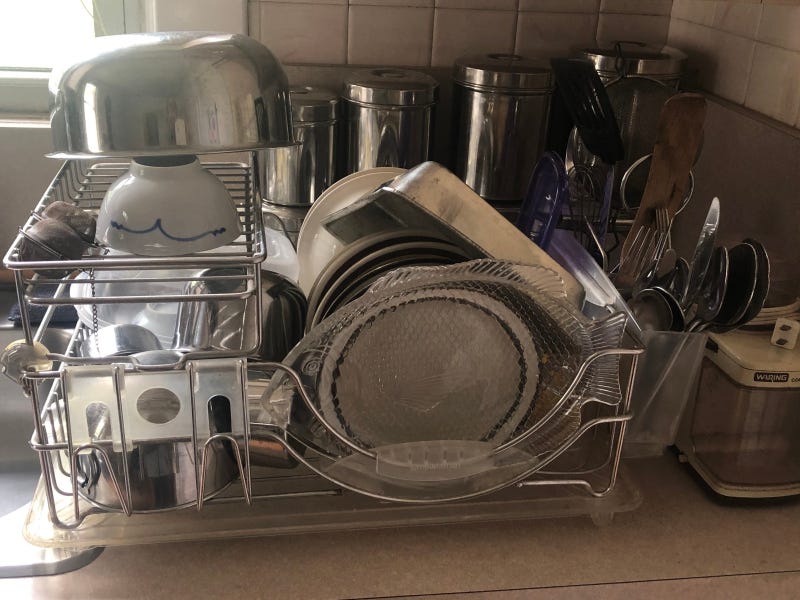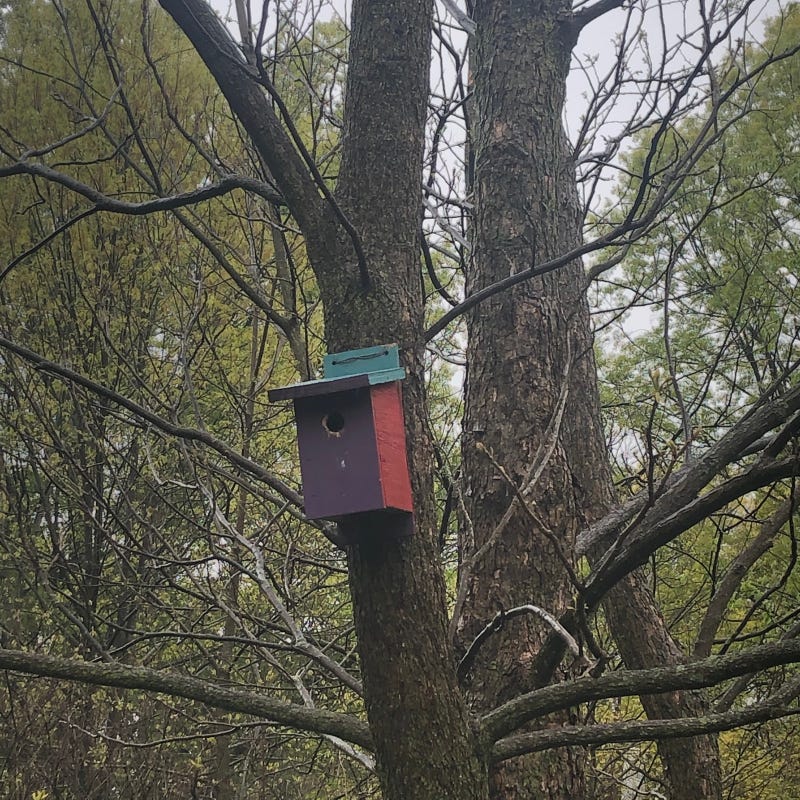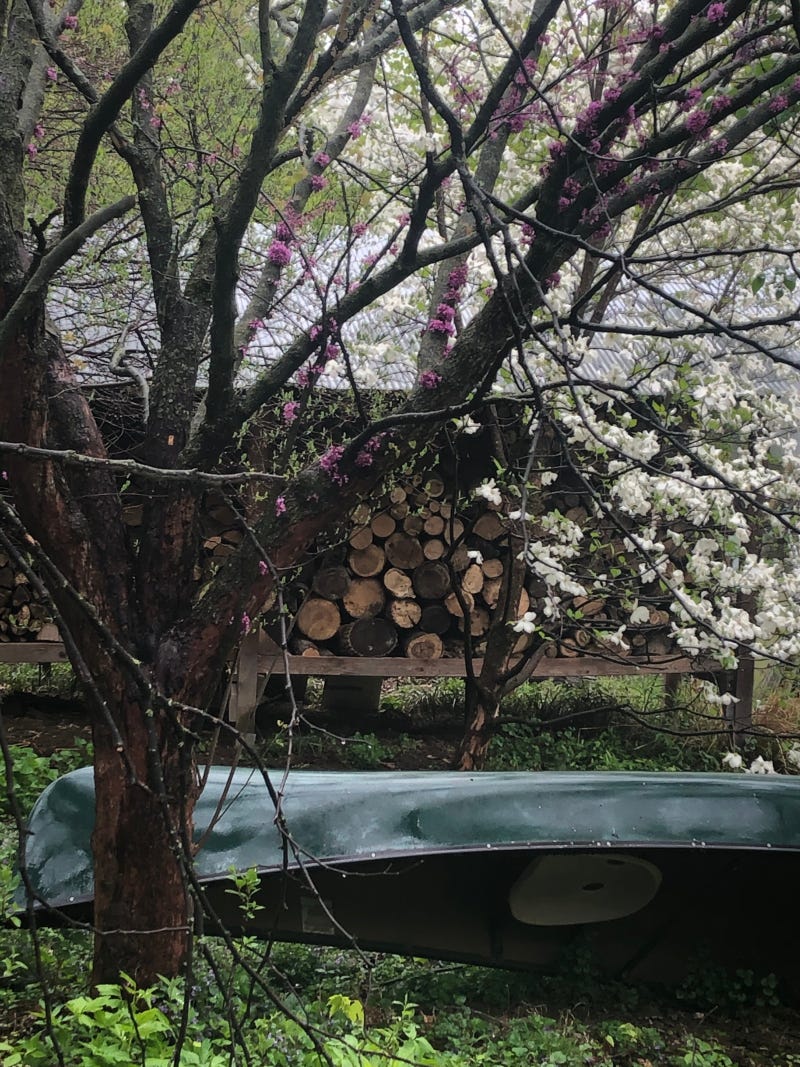A life of voluntary simplicity
A Q&A with Claire Schosser of Living Low in the Lou.
Part 1 of a 3-Part Series
Claire Schosser writes Living Low in the Lou, a blog chronicling her and her husband Mike's journey of reduced energy consumption and self-sufficiency. She opted for early retirement back in the mid-1990s (with Mike following in 2001) by reducing their expenses through living simply, growing much of their own food, and forgoing many of the shiny new conveniences that the rest of us take as givens. For those outside the area, "the Lou" is a popular nickname for St. Louis, Missouri. The Schosser/Gaillard homestead is located on a one-acre plot in suburban St. Louis and includes many mature, productive nut and fruit trees, an extensive annual garden, an herb garden, and a glassed-in front porch that functions as a greenhouse.
Claire and I discussed their lifestyle and garden over the course of two in-person visits and many back-and-forth email conversations over the course of a year, along with an early-spring garden tour. All images below are Lisa’s, taken during the tour. This three-part Q&A series covers the topics:
voluntary simplicity
suburban homesteading
getting the most food for the time and space
LB: You call your way of life "voluntary simplicity." For our readers, explain how you live, and how it's different from mainstream expectations.
CS: Voluntary simplicity means that we decide what our values are and how to live to express those values instead of allowing mass culture to tell us what we are supposed to value and how we are supposed to live. It also means doing our best to live within the limits of what the earth can provide.
The less time we spend on earning money and on all the activities, like commuting, that are required to earn money, the more time we have for our own interests. Spending less time earning money means we have less money to spend, so we limit the goods and services that money buys to the lowest level that we can manage. The less we spend on any particular good or service means the more we have to spend on something else we might need or want, so we prefer goods that are high quality and last for a long time and/or require little or no maintenance and/or are secondhand and/or are human-powered. We do our own cooking and cleaning and as many other basic household services as we have the skill to do. These choices generally entail using less energy and less energy-intensive materials than we would otherwise use, which also means we cause less pollution and waste to be produced so we come closer to living within the earth’s limits.
While others might see wild violets as weeds, Claire regards them as an early spring source of nibbles, as well as a food for pollinators.
LB: That sounds great. I have two followup questions for you on this. First, removed from the dependence on a job, how have you spent your time instead? Second, what sorts of modern conveniences have you decided are not important? Do you wash your dishes by hand? Line-dry your clothes? I ask because Anthony and I began hand-washing our dishes last year since dishwashers are so weak these days that we ended up washing them ourselves after a wash cycle anyway, and we wanted to save money as well as use the wash water in our garden afterward. We were surprised to find we both actually enjoy washing dishes—it's meditative and satisfying.
CS: The house didn’t include a dishwasher when we bought it, and the kitchen is so small I didn’t want to lose any space to a dishwasher, so I decided I would wash the dishes by hand. Although I had a dishwasher most of my adult life, I find I don’t miss it at all. I often mull over ideas while I’m doing the dishes, or I listen to music.
After washing the dishes, I put as many as I can on a rack and let them air-dry. Perhaps I’m easily amused, but it’s satisfying to find a way to arrange the dishes on the rack so I don’t have to dry any of them myself!
While we have a clothes dryer—it came with the house—I dry our clothes on clothes racks most of the year. Because they aren’t abrading each other as they tumble around in the dryer, our clothes last many more years than they did when I used the clothes dryer all the time. My three pairs of fleece-lined blue jeans that I wear for five to six months of the year are well over 10 years old, and I can still wear them in public!
I don’t use a vacuum cleaner. Our floors are wood and linoleum, so I sweep them with a broom and mop them to clean them. We rake leaves with a rake and shovel snow with a shovel. I dig garden beds with a shovel instead of a tiller. Mike splits wood by hand. Sometimes he saws it by hand, too, although he uses an electric chainsaw when sawing by hand becomes too difficult.
We don’t have a television. Instead, we each read a lot and have particular interests that we pursue.
As for what we do instead of a job, we have lives. Granted, part of the time we do the not-so-fun things like cleaning, paying the bills and keeping track of expenditures, and mowing the mix of grass and weeds that isn’t part of one of the gardens. Most of the time, however, we are doing something that we enjoy and that furthers our life goals. This includes each of us having an active spiritual practice and doing volunteer work. We enjoy reading and creative pursuits such as writing and playing music. I spend a lot of time working on the various gardens and watching the birds who live here or visit.
LB: You and Mike shifted to this lifestyle back in 1994. Taking such drastic steps as you have to get off the hamster wheel was, I'm sure, rarer back then. What made you decide to do it? How hard was it, initially? What are your biggest struggles now?
CS: I came to St. Louis in 1984 to work as a research chemist for a large multinational corporation. If I had been happy with corporate life, perhaps I’d still be working and we wouldn’t be having this conversation. But I wasn’t happy. It wasn’t just that I didn’t like my job; nothing about corporate life appealed to me. I could see how every step up the corporate ladder restricted further what employees could say, do, or think. The only question was how long I could stand to continue working there. The answer: eight years.
When I quit my job, our household income dropped by almost two-thirds. We adjusted our spending downward, but within a year, it became clear that we were spending more than Mike earned. We tried to determine where we could reduce expenses enough to live on Mike’s wages, but we couldn’t seem to find any place where we could cut spending.
Luckily I found the book Your Money or Your Life in early 1994. By applying the nine-step program in the book, we learned which expenses really were fulfilling and in line with our values and which weren’t. Knowing that, we dropped or reduced the most unfulfilling expenses. Within six months we were saving money, which by itself was a big boost to morale. Since we had dropped unfulfilling expenses, we felt better from that as well.
Mike retired in 2001, when we calculated we had enough income from savings to cover all of our expenses. Then we moved in 2002 to our current house, drawing on savings to make energy-saving improvements. Interest rates declined in the early 2000s, reducing our income further. We went through some lean years, until we aged enough to begin drawing our pensions. Right now we’re doing well, while we continue to increase our resilience to economic fluctuations.
LB: That's an incredible life trajectory, Claire! By the way, Anthony's mother used Your Money Or Your Life (YMOYL) to retire early at age 55, pursuing a spiritual path and involving herself in a community called The Red Door that she helped found. She was active in both pursuits until she died of pancreatic cancer in 2011. So Anthony has read YMOYL as well. The problem for our generation, however, is that a lot of the advice in that book is no longer valid. Generation X has seen a dramatically widening wage gap between corporate leadership and the worker base. Pensions are no longer a thing (no employer has ever offered either of us one). Ours is the first generation in many to do less well than our parents. Finally, there are no longer any safe investments; savings accounts, CDs, etc., earn next to nothing, so we're left with very little besides the (rather volatile) stock market, and even today's 401Ks are tied to it. All that said, is there any advice you can give us as we work toward a hopeful kind of retirement? Also, I'm curious whether you had ever thought about leaving corporate life to go into a softer career, such as non-profits, or teaching? I've done both although in the end I had to opt for corporate work in order to pay off heavy student loan and other debt.
CS: YMOYL worked for Anthony’s mother and for us because we could take advantage of pensions and good interest rates on safe investments. Without those the YMOYL goal of living off of interest from savings for many years becomes impossible; ordinary people cannot save enough money to do that at the current very low interest rates.
I think the changes you’ve described are likely to continue and bring with them further changes that make the kind of retirement that my parents’ generation experienced a rare thing. To put it in ecological terms, previously stable economic patterns have been disturbed and are becoming more so with time. One of the things that permaculture teaches, a concept it borrowed directly from ecology, is that diverse ecosystems are more resilient to disturbance: they handle it better, it doesn’t tear them apart.
What you and Anthony are doing and what Mike and I are doing increases resilience to economic disturbances by increasing our options to respond to it. The only form of resilience many people know is to earn more money. That is becoming more difficult to do. However, a more potent form of resilience is to need, and spend, less money and to increase our skill base so that we can more easily adapt to changing conditions. By growing some of your own food, you spend less at the grocery store; you eat better so you are healthier; you learn a skill that you can share with others; and you enjoy the satisfaction of gardening. By refurbishing patio gliders you saved the money you would have spent on lower-quality patio furniture and their replacements when they broke, you learned another skill, you have sturdy and beautiful patio furniture that will last for as long as you have a patio, and you have the satisfaction of doing it yourself. Everything you write about shows the different ways in which you and Anthony increase your resilience and maximize your options for later in life. The best advice I can give you is to keep doing what you are doing!
You asked if I considered other options for paid work such as teaching or working for a non-profit organization. Although I enjoy teaching on an informal basis, I never considered teaching in public schools. Even when I attended them in the 1960s and 1970s, it was clear that you couldn’t teach what or how you wanted. In grad school I did my research with a professor who began his career the same semester I started, so I had a front-row seat to watch the pressures that are involved in obtaining tenure. That was enough to discourage me from becoming a professor. Non-profit work didn’t seem much different from corporate work to me, except that it didn’t pay as well.
To readers: We’ll continue next week with part 2. In the meantime, does this inspire you to scale down and unplug, at least a bit?








Superb interview and so relevant to now! My partner and I were forced out of our 40+ year nursing careers 3-4 years ago when we refused the covid jab and swab tests. Unplanned full retirement at 1/3 previous income stared at us so we quickly scaled down much as described here. We gave up one of the vehicles. We maintain and repair what we can. When the washer-dryer combo broke down, we got rid of it now handwash and line dry laundry. We don't go to shows every month and unsubscribed from almost everything. No more elaborate vacations. We're living well within our means and what our garden and farmer's market provides, and stay close to our rural home which is surrounded by nature. Looking forward to part 2!
With these inflationary times we live in, I've re-employed many skills I learned in childhood for simple living, cooking, repairing etc. I've actually reduced our grocery bill to pre-2020 levels while eating better. It's already normal here in New Zealand to line-dry clothing, and also normal to have a wood burner fire as winter heating. I am grateful I learned to cook, bake, sew, care for animals, clean, do laundry and be innovative as a child. These things are harder to adjust to if learning them as an adult I think. Great article, I really enjoyed the perspectives!